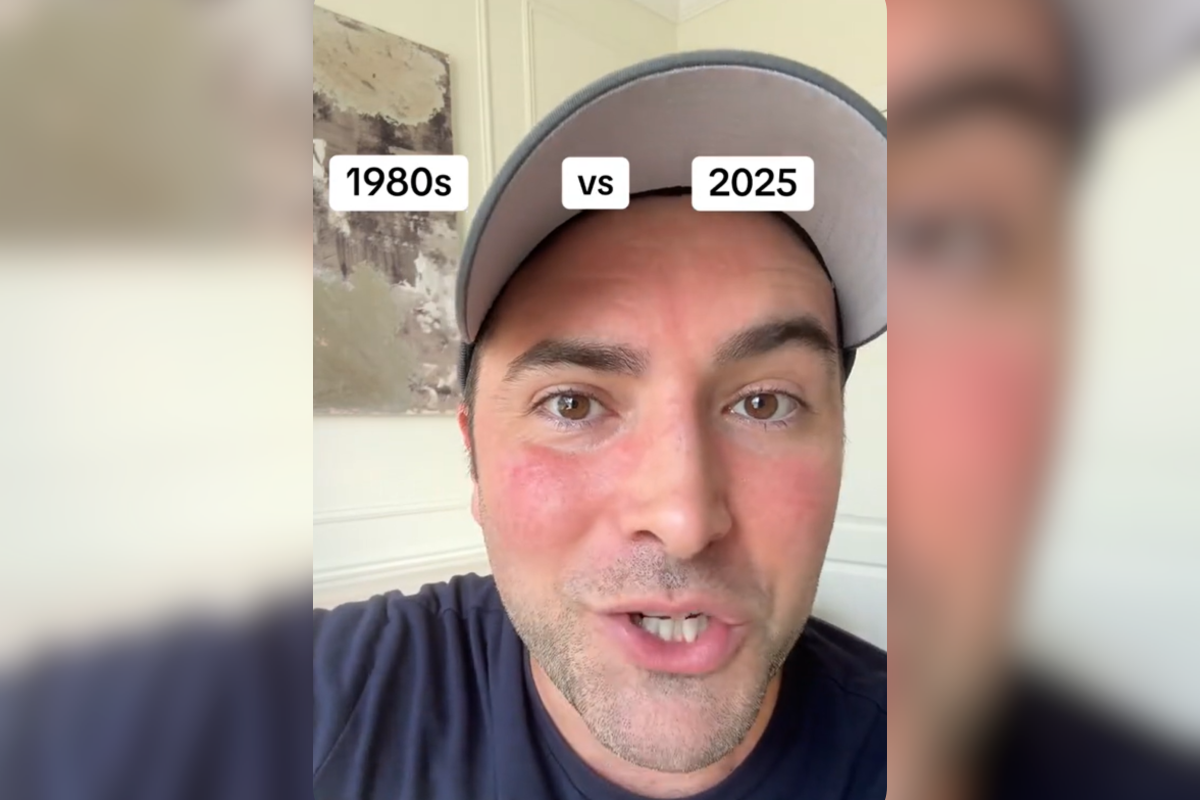A man's theory about why baby boomers don't understand young people's spending habits has gone viral on social media.
Freddie Smith, 36, of Orlando, Florida, shared a video on TikTok (@fmsmith319) explaining why he thinks there's a stark contrast between how older generations perceive wealth, and how younger generations regard it. In the clip, the millennial (people born between 1981 and 1996) lists the average costs of rent, salaries and electrical items back in the 1980s, and compares them to 2025.
The comparisons show that necessities (such as rent and groceries) have skyrocketed, while things deemed more to be luxuries (televisions, cell phones and microwaves) are more reasonable. Smith told Newsweek that the price of luxuries has inverted with necessities, which is "one of the biggest financial shifts in modern history."
In the days since the video was shared on TikTok, it's gone viral, with 1.6 million views and 195,600 likes at the time of writing.

"The main shift is that core essentials—housing, education, healthcare, and even food—have become more expensive," Smith said. "Housing and rent, for instance, now outpace wage growth, making homeownership feel unattainable for many. The cost of childcare has also skyrocketed, and food prices have increased.
"As a result, I think older generations have a different perspective on luxury versus necessity. They grew up in a time when hard work typically led to financial stability, whereas today, even with hard work, many people struggle with the high costs of housing, rent and medical expenses. Basic survival used to be far more affordable, allowing people more financial room to build a stable life."
The statistics from Smith's viral video were pulled from news articles, the Bureau of Labor Statistics, Federal Reserve economic data and the U.S. Census Bureau.
In addition, Smith notes that wages haven't kept pace with the cost increases. According to the U.S. Census Bureau, the median family in 1980 had an income of $21,020, whereas the median household income in 2023 was $80,610.
While televisions, CD players (remember those?) and microwaves might have once seemed like lavish purchases, they are now far more reasonable. This is a result of technological advancements, globalization and automation, which have made manufacturing and shipping much cheaper.
This is why Smith thinks older generations don't understand the millennial and Generation Z (people born between 1997 and 2012) spending habits. He believes they still see consumer products as "status symbols," but that just isn't the case for younger people, who consider financial freedom to be the ultimate luxury.
Smith told Newsweek: "Expensive things were rare when they were young, so older generations often equate luxury with wealth. But today, it's possible to have an iPhone, nice clothes, or take a vacation while still struggling financially. They also focus on small discretionary expenses, like coffee, rather than recognizing how fixed costs (housing and student loans) have dramatically increased.
"This is why millennials and Gen Z feel like they're constantly on a treadmill—it's not about poor spending habits; it's that the economic game has changed," he continued.
This view was echoed by Brian Fees, managing partner at WealthVisory, who told Newsweek that spending habits evolve as generations are "shaped by the economic challenges they face."
With the rising cost of basics, Fees suggests that young people aren't necessarily wasting their money, but they're simply adjusting to their economic reality.
"The affordability of modern luxuries means young people can enjoy some comforts, even while navigating financial pressures that older generations didn't face," he said. "At the same time, the rising cost of housing, groceries, health care and utilities has made it harder to save.
"Similarly, coffee shops have turned what used to be an occasional indulgence into an everyday habit for many. This reflects a change in cultural values, where convenience and small indulgences are now integrated into daily life and viewed as a normal part of budgeting."
Social Media Reaction
Smith has been amazed by the conversation that he has sparked. It wasn't supposed to blame anyone or make excuses, but rather to help people understand the nuances within the system and how things have changed over time.
"One of the biggest questions I've been exploring is what has changed since the 1980s that's made it so much more difficult for our generation," Smith said. "My goal is to bring people together so we can have productive conversations. At the end of the day, we all want the same thing: a fair shot at financial security and a better future."
The clip has amassed more than 3,100 comments on TikTok at the time of writing, as many social media users joined the discussion.
One comment reads: "This is actually the best explanation I've seen of this, well done!"
Another TikTok user wrote: "I've heard of girl math before, but millennial math? This is new. I need more of these videos!"
One person added: "cell phones and computers are not luxuries, you pretty much need them to survive at this point."
Do you have a monetary dilemma? Let us know via life@newsweek.com. We can ask experts for advice, and your story could be featured on Newsweek.
Is This Article Trustworthy?
Is This Article Trustworthy?
Newsweek is committed to journalism that is factual and fair
We value your input and encourage you to rate this article.
Newsweek is committed to journalism that is factual and fair
We value your input and encourage you to rate this article.
About the writer
Alyce Collins is a Newsweek Life and Trends reporter based in Birmingham, U.K. with a focus on trending topics that ... Read more



